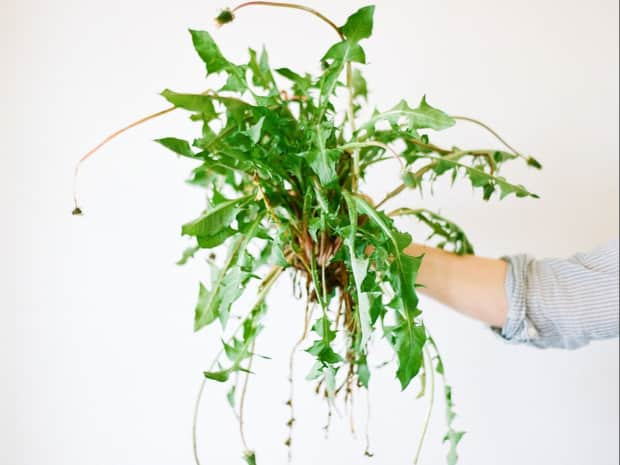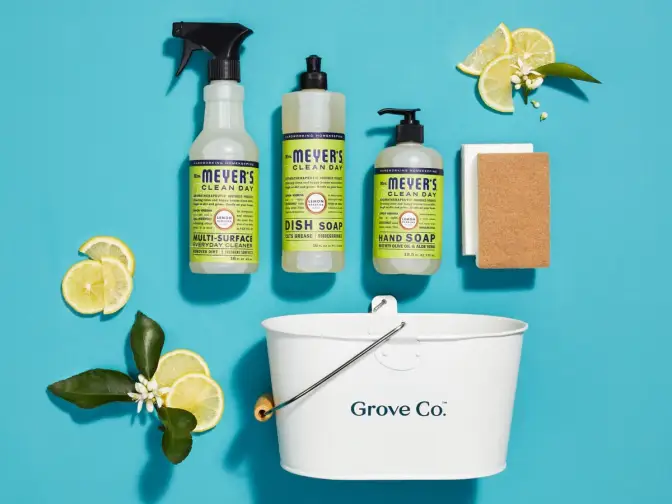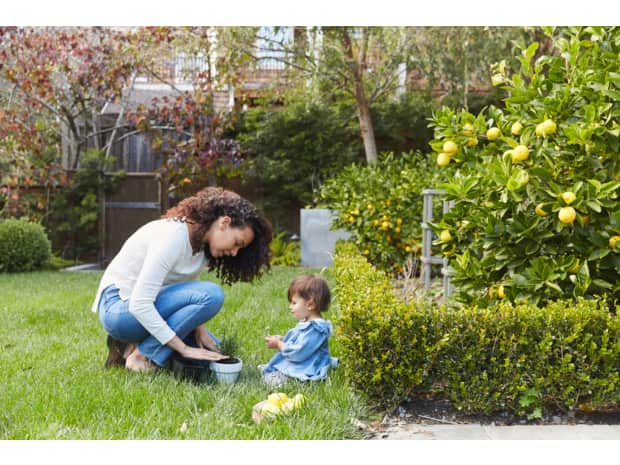1. Pull ‘em up by the roots
Digging up weeds manually may not be fun, but this method has definitely stood the test of time.
Use a garden fork or hand trowel with the goal of removing the entire root system for good.


Last Updated: December 7, 2021
Tired of weeds threatening your lawn, veggies, or flowers? Learn how to get rid of weeds the natural way using things you probably already have in your pantry.
Even if you have a green thumb, nothing can ruin your lawn or garden like annoying weeds. If these pesky plants are threatening your vegetables, flowers, or lawn, the good news is that you don’t have to let them take over.
Many common lawn weeds can wreak havoc on your grass, but we’ve identified the best ways to get rid of weeds without using harmful chemicals that could pollute waterways or your lawn. Here’s how to get rid of weeds — the natural way.
Sick and tired of flowerbeds full of dandelions or a lawn riddled with poison ivy? A variety of common garden weeds can turn your beautiful landscape into an absolute nightmare.
Weeds like to sow seeds whenever they get the chance, but getting rid of weeds fast — and permanently — isn’t as difficult as you think.
Whether your weeds are in the garden, the vegetable patch, or the lawn, this guide from The National Gardening Association will identify the specific weeds you’re dealing with to help you tackle the problem head on.
Wondering how to get rid of weeds without killing your grass? We’ve rounded up these 3 tips to restore order to your lawn naturally, without harming your grass with toxic chemicals.
Digging up weeds manually may not be fun, but this method has definitely stood the test of time.
Use a garden fork or hand trowel with the goal of removing the entire root system for good.
Dealing with a lawn full of weeds? To get rid of weeds in grass, you can usually use a mower.
As long as they’re not the kind of weeds that spread seeds — like dandelions — regular mowing is a great way to get rid of weeds over time.
Keep garden weeds away in the first place by adding a three- to four-inch layer of mulch to your garden beds to prevent sunlight from reaching the weeds, and they won’t be able to grow.
The Old Farmer’s Almanac states that when weeds take over your prized flower or vegetable garden, they remove vital nutrients from the soil.
Don’t worry — we’ve got you covered! Here are 3 simple, natural weed killers to protect your garden from stubborn weeds.

Use your go-to natural dish soap to break down the waxy or hairy surfaces on a variety of weeds.
Add a few drops of soap with water in a spray bottle and spray directly onto the plants.

Pour an acetic acid like distilled white vinegar or cleaning vinegar into a spray bottle and spritz it on the weeds.
Just be careful not to spray grass or plants that are meant to be there — vinegar will kill those, too.

Heat up the tea kettle and pour the boiling water directly onto the weeds.
They’ll instantly burn up — just don’t pour any water on your good plants, or they’ll die, too.
Then, make a cup of tea afterwards to celebrate!
Weeds are an inevitable part of gardening, but they don’t have to become a major nuisance.
Check out this video for even more helpful ways to get rid of weeds — for good!
Ready to take your gardening skills indoors? Check out our members’ choices for the best indoor gardening kits for growing herbs, vegetables, and flowers.

Wondering who Grove is, what types of products we offer, and how to get a free gift set when you sign up? Learn more about flexible monthly shipments, customizing your shipment, and joining millions of happy households — no monthly fees or commitments required.
Don’t add weeds to your compost bin along with your other compostable household items, or they may reseed later on once they make it to their final resting place.
Instead, throw them out in your general waste bin, or use them as fuel in your next bonfire — just don’t burn stuff like poison ivy or Japanese knotweed that could release toxins or allergens into the air!
Learn about the most eco-friendly ways to dispose of a Christmas tree to keep things merry and bright long after the season is over!
You may think you’re doing your lawn a favor by raking those piles of fall leaves, but you may be doing more harm than good.
According to the Chesapeake Bay Foundation, leaves provide important organic matter that protects your lawn.
Leaving leaves on your lawn:
Grove Tip
Need more ways to get your garden growing without harmful chemicals?
Our gardening products include natural, organic potting soil, plant food, garden pest control remedies, and plant biotics.
We also have a slew of indoor grow kits and seeds to keep you in green things in any season.

With these natural moss removal tips you'll be able to quickly remove moss like a boss and get back to loving your lawn.

Are you working on your green thumb? Well, with this guide you’ll at least understand the differences between gardening with soil vs. dirt. Read on!

Learn how to identify drain flies and use both natural and chemical methods for eliminating these pesky pests from your home.

Tired of dealing with disgusting mold or mildew in your home? Learn how to kill mold naturally from the pros at Grove and prevent it from ever coming back.